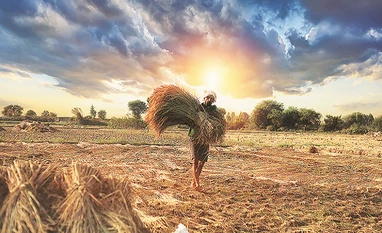Since the scheme’s inception, the central government has spent about Rs 50,000 crore as its share of premium subsidy.
Agriculture Minister Narendra Singh Tomar said that according to its estimates currently 58 per cent of total farmers are loanees. The scheme would be voluntary for loanee farmers from the kharif season of 2020.
The share of non-loanee farmers, for whom the scheme is voluntary, has been steadily rising, which shows that there a vast section of growers are in favour of the scheme.
Data shows that in kharif 2016, around 10.2 million non-loanee farmers enrolled in the scheme, which rose to 12.4 million by kharif 2018, a jump of about 22 per cent. In rabi 2016-17, the share of non-loanee farmers was 3.4 million, which rose to 7.9 million by rabi 2018-19, an increase of 132 per cent.
Total enrollement under the scheme, though, has been falling. It was 40.4 million in kharif 2016, dropping to 34.8 million by kharif 2018, a fall of about 14 per cent.
The government blamed loan waiver schemes announced by state governments along with mandatory Aadhar linkage for the dwindling interest in PMFBY. Critics, however, said delayed compensation and improper working of the scheme were some reasons for farmers preferring to opt out.
Some critics feel that making the scheme voluntary could lead to higher actuarial premium under PMFBY, leading to higher subsidy outgo from the government. However, others said it could lead to more efficiency as nowhere across the world farmers could avail of crop insurance at such low rates.
Under PMFBY, farmers pay 2 per cent of the sum insured as their share of premium for kharif crops, 1.5 per cent for rabi crops and 5 per cent for horticulture and commercial crops. If the actuarial premium is lower than this rate, the lower of the two would apply. The difference between the actuarial premium rate and the premium paid by farmers is the subsidy shared equally by the Centre and states.
The proposal to make PMFBY voluntary for all was, in fact, part of the Bharatiya Janata Party’s 2019 election manifesto.
The Union Cabinet also made other changes to the scheme, including introducing cut-off dates for states to release their share of premium subsidy. If states don’t release their share before March 31 for the kharif season and September 30 for rabi, they won’t be allowed to implement the scheme. Data shows a large number of states that participate in the scheme don’t release their share on time, which leads to delayed compensation payment to farmers.
The Cabinet also decided to launch a new scheme for promoting and creating 10,000 new farmer producer organisations (FPOs) in the next five years, starting from 2019-20. A total budgetary provision of Rs 6,865 crore was allocated for the scheme for handholding each FPO.
Small Farmers’ Agribusiness Consortium (SFAC), National Bank for Agriculture and Rural Development (Nabard) and National Cooperative Development Corporation (NCDC) will be the nodal agencies to promote FPOs.
That apart, credit gurantee fund of Rs 1,000 crore has also been created in Nabard for FPOs and another Rs 500 crore in NCDC for enabling easy credit to FPOs.
Cabinet Decisions
- The Union Cabinet on Wednesday approved the assisted reproductive technology (regulation)
Bill that proposes establishment of a national registry and registration authority for all clinics and medical professionals serving in the field. - Law Commission: Cabinet approved the constitution of the 22nd Law Commission, which advises the government on complex legal issues
- Second phase of Swachh Bharat Mission (Rural) to focus on management of solid and liquid waste to be implemented with an estimated budget of Rs 52,497 crore from next year
- Interest subvention on loans given to the dairy sector raised from 2 per cent to 2.5 per cent to benefit 9.5 million farmers
- Empowered Technology Group constituted to render timely policy advice on latest technologies; mapping of technology and technology products
To read the full story, Subscribe Now at just Rs 249 a month
Already a subscriber? Log in
Subscribe To BS Premium
₹249
Renews automatically
₹1699₹1999
Opt for auto renewal and save Rs. 300 Renews automatically
₹1999
What you get on BS Premium?
-
Unlock 30+ premium stories daily hand-picked by our editors, across devices on browser and app.
-
Pick your 5 favourite companies, get a daily email with all news updates on them.
Full access to our intuitive epaper - clip, save, share articles from any device; newspaper archives from 2006.
Preferential invites to Business Standard events.
Curated newsletters on markets, personal finance, policy & politics, start-ups, technology, and more.
Need More Information - write to us at assist@bsmail.in
)